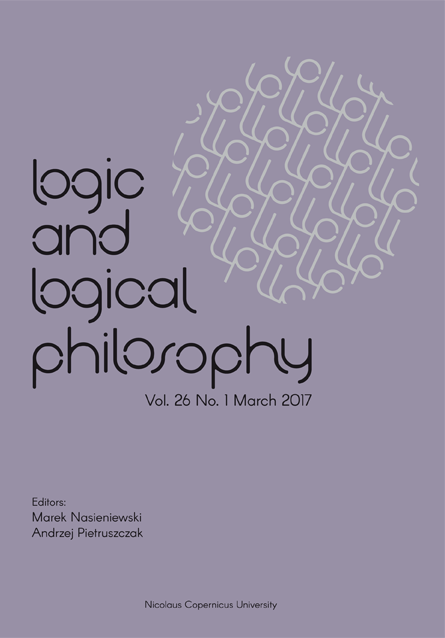Profiles of Dialogue for Repairing Faults in Arguments from Expert Opinion
DOI:
https://doi.org/10.12775/LLP.2016.014Słowa kluczowe
arguments from authority, argument from expert opinion, profiles of dialogue, examination of expert witnesses, argument graphs, ad verecundiam fallacyAbstrakt
Using the profiles of dialogue method we identify a species of ad verecundiam fallacy that works by forestalling of questioning in arguments from expert opinion. A profile of dialogue is a graph structure used to model a sequence of speech acts surrounding both the putting forward of an argument and the response to it at the next moves in a dialogue. The method is applied to a case of cross-examining a software engineer in a legal deposition in a case of intellectual property litigation.Bibliografia
Atkinson, K., T.J.M. Bench-Capon, and D. Walton, “Distinctive features of persuasion and deliberation dialogues”, Argument and Computation, 4, 2 (2013): 105–127. DOI: 10.1080/19462166.2012.708670
Bex, F., and C. Reed, “Dialogue templates for automatic argument processing”, in Proceedings of the 4th International Conference on Computational Models of Argument (COMMA 2012), Vienna, IOS Press, 2012.
Budzynska, K., and C. Reed, “Whence inference?”, University of Dundee Technical Report, 2011.
Dunne, P.E., S. Doutre, and T.J.M. Bench-Capon, “Discovering inconsistency through examination dialogues”, in Proceedings of IJCAI-05 (International Joint Conferences on Artificial Intelligence), Edinburgh, 2005.
Freeman, J., Dialectics and the Macrostructure of Arguments: A Theory of Argument Structure, Berlin, De Gruyter, 1991.
Goodwin, J., “Forms of authority and the real ad verecundiam”, Argumentation, 12 (1998): 267–280.
Gordon, T., “An overview of the carneades argumentation support system”, in C.W. Tindale and C. Reed (eds.), Dialectics, Dialogue and Argumentation. An Examination of Douglas Walton’s Theories of Reasoning, London, College Publications, 2010.
Hamblin, C.L., Fallacies, London, Methuen, 1970.
Hamblin, C.L., “Mathematical models of dialogue”, Theoria, 37 (1971): 130–155.
Harary, F., Graph Theory, Menlo Park, Addison-Wesley, 1972.
Krabbe, E.C.W., “So what? profiles for relevance criticism in persuasion dialogues”, Argumentation, 6 (1992): 271–283.
Krabbe, E.C.W., “Profiles of dialogue as a dialectical tool”, Chapter 10 in F.H. van Eemeren (ed.), Advances in Pragma-Dialectics, Amsterdam and Newport News, VA, Sic Sat & Vale Press, 2002.
Krabbe, E.C.W., “Topical roots of formal dialectic” Argumentation, 27 (2013): 71–87. DOI: 10.1007/s10503-012-9278-3
Lorenzen, P., and K. Lorenz, Dialogische Logik, Darmstadt, Wissenschaftliche Buchgesellschaft, 1978.
Parsons, S., K. Atkinson, Z. Li, P. McBurney, E. Sklar, M. Singh, K. Haigh, K. Levitt, and J. Rowe, “Argument schemes for reasoning about trust”, Argument and Computation, 5, 2–3 (2014): 160–190. DOI: 10.1080/19462166.2014.913075
Prakken, H., “On dialogue systems with speech acts, arguments, and counterarguments”, in Proceedings of JELIA’2000, The 7th European Workshop on Logics in Artificial Intelligence, Springer Lecture Notes in AI 1919, Berlin, Springer, 2000.
Prakken. H., “Formal systems for persuasion dialogue”, The Knowledge Engineering Review, 21, (2006): 163–188. DOI: 10.1017/S0269888906000865
Prakken, H., “An overview of formal models of argumentation and their application in philosophy”, Studies in Logic, 5 (2011): 65–86.
van Eemeren, F.H., Strategic Maneuvering in Argumentative Discourse. Extending the Pragmaialectical Theory of Argumentation, Amsterdam and Philadelphia, PA, John Benjamins Publishing Company, 2010.
van Eemeren, F.H., and R. Grootendorst, Speech Acts in Argumentative Discussions: A Theoretical Model for the Analysis of Discussions Directed Towards Solving Conflicts of Opinion, Dordrecht, Foris Publications, 1984.
van Eemeren, F.H., P. Houtlosser, and F. Snoeck Henkemans, “Dialectical profiles and indicators of argumentative moves”, Journal of Pragmatics, 40, 3 (2008): 475–493. DOI: 10.1016/j.pragma.2007.12.002
Walton, D., Logical Dialogue-Games and Fallacies, Lanham, Maryland, University Press of America, 1984.
Walton, D., Question-Reply Argumentation, Westport, Connecticut, Greenwood Press, 1989.
Walton, D., Appeal to Expert Opinion, University Park, PA, Pennsylvania State University Press, 1997.
Walton, D., “Profiles of dialogue for evaluating arguments from ignorance”, Argumentation, 13 (1999): 53–71.
Walton, D., “Examination dialogue: An argumentation framework for critically questioning an expert opinion”, Journal of Pragmatics, 38, 5 (2006): 745–777. DOI: 10.1016/j.pragma.2005.01.016
Walton, D., Burden of Proof, Presumption and Argumentation, Cambridge, Cambridge University Press, 2014. DOI: 10.1017/CBO9781107110311
Walton, D., “Profiles of dialogue: A method of argument fault diagnosis and repair”, Argumentation and Advocacy, 52, 2 (2015): 91–108.
Walton, D., and M. Koszowy, “Two kinds of arguments from authority in the ad verecundiam fallacy”, pages 1483–1492 in B.J. Garssen, D. Godden, G. Mitchell, and A.F. Snoeck Henkemans (eds.), Proceedings of the 8th Conference of the International Society for the Study of Argumentation (ISSA), Amsterdam, Sic Sat, 2015.
Walton, D., and E.C.W. Krabbe, Commitment in Dialogue, Albany, SUNY Press, 1995.
Wells, S., “Supporting argumentation schemes in argumentative dialogue games”, Studies in Logic, Grammar and Rhetoric, 36, 1 (2014): 171–191. DOI: 10.2478/slgr-2014-0009
Wolf, J., “Combinatorics”, Lecture Notes, University of Bristol, 2015.
Zeidman, B., “The case of the arrogant expert”, Intellectual Property Today, 2, 2012.
Pobrania
Opublikowane
Jak cytować
Numer
Dział
Statystyki
Liczba wyświetleń i pobrań: 630
Liczba cytowań: 5







